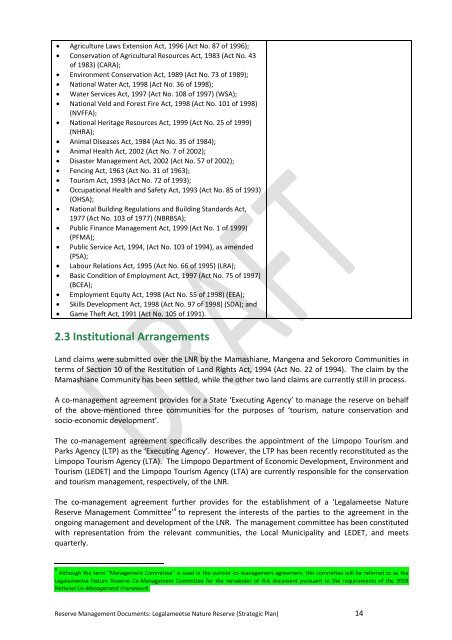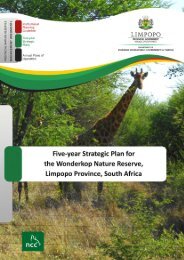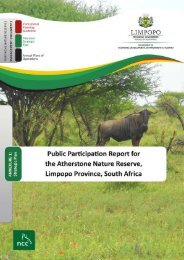Guiding principles for reserve management - NCC Environmental ...
Guiding principles for reserve management - NCC Environmental ...
Guiding principles for reserve management - NCC Environmental ...
- No tags were found...
You also want an ePaper? Increase the reach of your titles
YUMPU automatically turns print PDFs into web optimized ePapers that Google loves.
Agriculture Laws Extension Act, 1996 (Act No. 87 of 1996); Conservation of Agricultural Resources Act, 1983 (Act No. 43of 1983) (CARA); Environment Conservation Act, 1989 (Act No. 73 of 1989); National Water Act, 1998 (Act No. 36 of 1998); Water Services Act, 1997 (Act No. 108 of 1997) (WSA); National Veld and Forest Fire Act, 1998 (Act No. 101 of 1998)(NVFFA); National Heritage Resources Act, 1999 (Act No. 25 of 1999)(NHRA); Animal Diseases Act, 1984 (Act No. 35 of 1984); Animal Health Act, 2002 (Act No. 7 of 2002); Disaster Management Act, 2002 (Act No. 57 of 2002); Fencing Act, 1963 (Act No. 31 of 1963); Tourism Act, 1993 (Act No. 72 of 1993); Occupational Health and Safety Act, 1993 (Act No. 85 of 1993)(OHSA); National Building Regulations and Building Standards Act,1977 (Act No. 103 of 1977) (NBRBSA); Public Finance Management Act, 1999 (Act No. 1 of 1999)(PFMA); Public Service Act, 1994, (Act No. 103 of 1994), as amended(PSA); Labour Relations Act, 1995 (Act No. 66 of 1995) (LRA); Basic Condition of Employment Act, 1997 (Act No. 75 of 1997)(BCEA); Employment Equity Act, 1998 (Act No. 55 of 1998) (EEA); Skills Development Act, 1998 (Act No. 97 of 1998) (SDA); and Game Theft Act, 1991 (Act No. 105 of 1991).2.3 Institutional ArrangementsLand claims were submitted over the LNR by the Mamashiane, Mangena and Sekororo Communities interms of Section 10 of the Restitution of Land Rights Act, 1994 (Act No. 22 of 1994). The claim by theMamashiane Community has been settled, while the other two land claims are currently still in process.A co-<strong>management</strong> agreement provides <strong>for</strong> a State ‘Executing Agency’ to manage the <strong>reserve</strong> on behalfof the above-mentioned three communities <strong>for</strong> the purposes of ‘tourism, nature conservation andsocio-economic development’.The co-<strong>management</strong> agreement specifically describes the appointment of the Limpopo Tourism andParks Agency (LTP) as the ‘Executing Agency’. However, the LTP has been recently reconstituted as theLimpopo Tourism Agency (LTA). The Limpopo Department of Economic Development, Environment andTourism (LEDET) and the Limpopo Tourism Agency (LTA) are currently responsible <strong>for</strong> the conservationand tourism <strong>management</strong>, respectively, of the LNR.The co-<strong>management</strong> agreement further provides <strong>for</strong> the establishment of a ‘Legalameetse NatureReserve Management Committee’ 4 to represent the interests of the parties to the agreement in theongoing <strong>management</strong> and development of the LNR. The <strong>management</strong> committee has been constitutedwith representation from the relevant communities, the Local Municipality and LEDET, and meetsquarterly.4 Although the term “Management Committee” is used in the current co-<strong>management</strong> agreement, this committee will be referred to as theLegalameetse Nature Reserve Co-Management Committee <strong>for</strong> the remainder of this document pursuant to the requirements of the 2009National Co-Management Framework.Reserve Management Documents: Legalameetse Nature Reserve (Strategic Plan) 14

















